Varieties of sofas: classification and selection
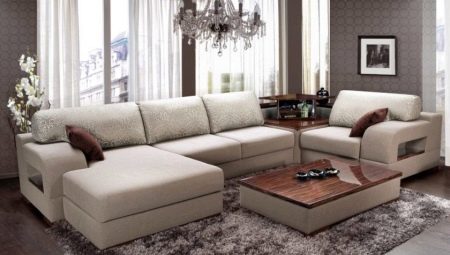
The sofa is the most used element of the interior. It is often used for several purposes at once - for sitting, resting or sleeping. Therefore, when choosing furniture, you need to take into account not only the appearance, but also the types of sofas: classification, technical characteristics. This will help you choose a visually beautiful model that will complement the interior, but at the same time will allow you to rationally use the space of the room.
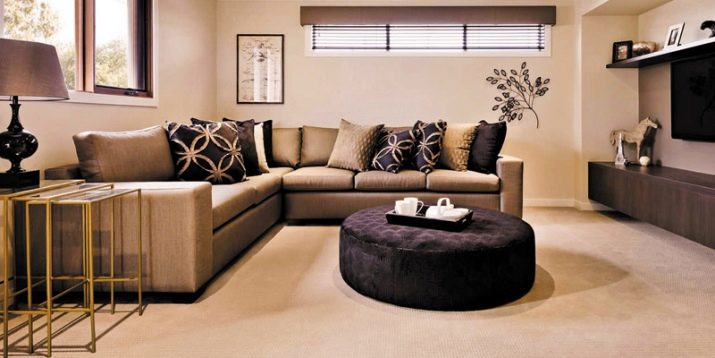

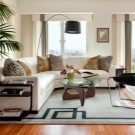
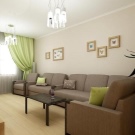
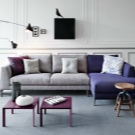
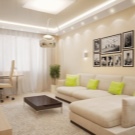
What are they?
There is no strict classification of sofas, but there are generally accepted standards and terms. Choosing a sofa, as a rule, take into account its design indicators, functional features and spaciousness. The characteristics can be highlighted in a separate list and rely on when choosing your individual model, which will be especially important if the furniture is made to order.
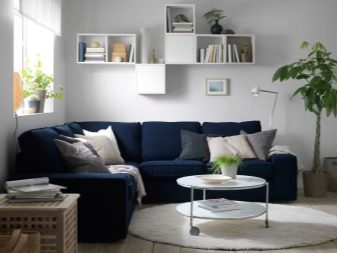
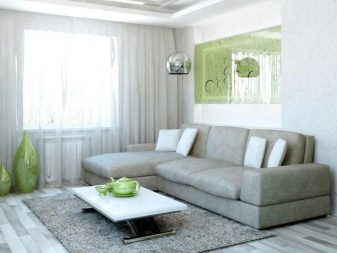
By form
It is recommended to choose a sofa of such a shape or design so that it does not take up extra space in the room. This piece of furniture should be located so as to fill the unused area of the room, and the walkways or, for example, the play area in the children's room, were free. By design, sofas are conventionally divided into four types.
- Corner. Such models successfully occupy unused corner niches; straight backs can be leaned against the walls. The angular shape is great for small, one-room apartments, small kitchens. In rooms with a large area, the corner design allows you to zone the space.
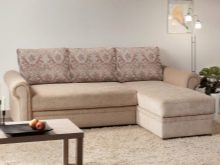
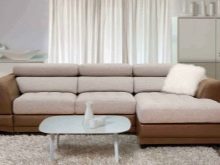
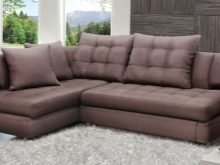
- Direct or stationary Is the most popular form of furniture due to its many placement options.Straight sofas are conveniently installed along the walls, in the center and corners of the room, small compact models can easily move around the room. Most straight sofas are convertible or pull-out. Installed in the center of the room near the wall, if necessary, they can serve as a full double bed.
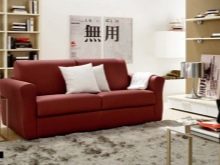
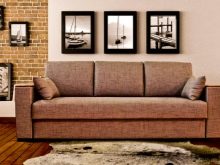
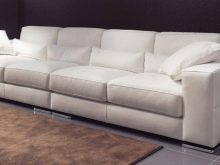
- Modular sofas - the most mobile and multifunctional type of furniture, their design consists of several parts that can be used both together and separately. If necessary, the parts are combined in a different order, for example, a large corner sofa can be taken apart into two straight lines or small separate modules are used as ottomans.
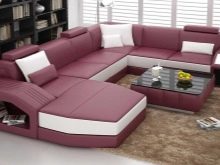
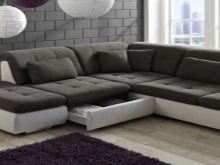
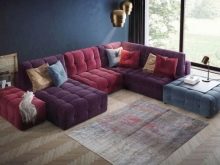
- Insular - these models are less popular in comparison with the previous forms, since they mainly involve installation in large rooms. Made in the form of islands, they are installed in the middle of the room, or in the corner in the case of zoning the area. Island models take up a lot of usable space, but they look presentable and help to embody bold design decisions.
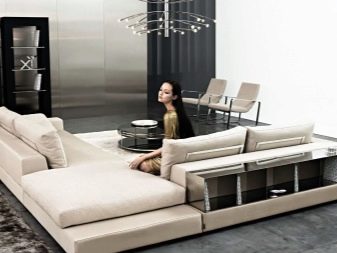
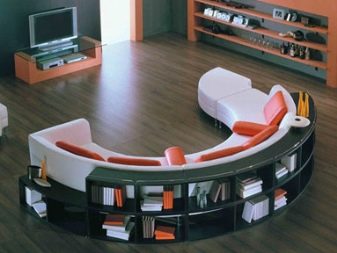
When choosing the shape of the furniture, it is important not to forget about its volume, the total area that it will occupy.
The sofa in the living room or in the kitchen should not be too wide, in these rooms it is better to leave more room for movement. In apartments, where a folding sofa is planned to be used as a sleeping place, models with a wide seat are suitable, but for rest rooms, designs are often chosen not only with a wide, but also with a deep fit.
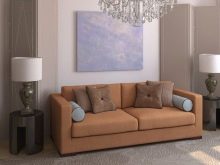
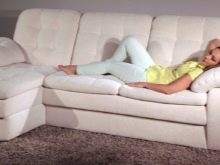
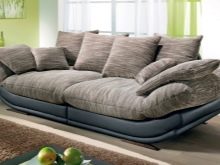
By appointment
The shape and design of the sofa is also selected taking into account the purpose of the furniture, the choice of the material of manufacture will depend on this indicator, as well as the total cost of the future product. For example, models with inexpensive upholstery are suitable for the kitchen; for sleeping places, it is advisable to order sofas made of natural materials; in work or office premises, it is more practical than products covered with leather. According to its purpose, this element of upholstered furniture is classified into five types:
- office, for study rooms;
- for the hall, living rooms;
- for kitchens and dining rooms;
- into the hallway or corridor;
- for children's and playrooms.
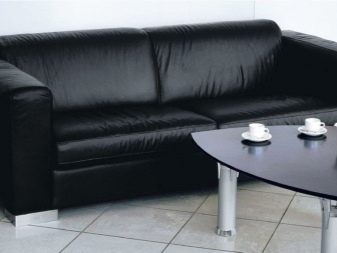
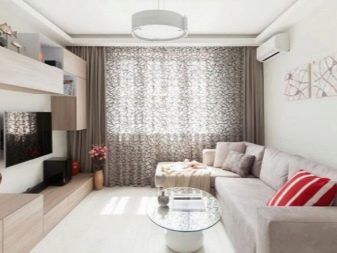
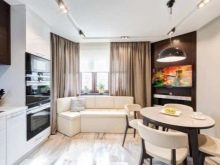
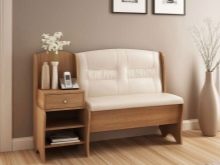
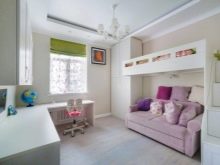
If additional sleeping places are periodically needed, it is better to choose a stationary straight view of the sofa, it is also suitable for office premises.
In places of relaxation - in the living room, bedroom or dining room - a good solution would be modular version. Island models are convenient for zoning rooms - in workrooms, such sofas are used to equip places for informal conversation, in halls they are installed in front of televisions.
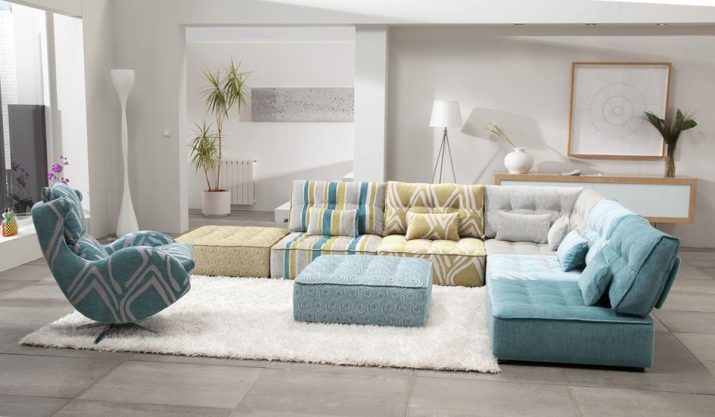
By size
The dimensions of a sofa mean not only its actual length and width in centimeters, but also the number of seats (or sleeping places, in the case of a folding version). Compact models, as a rule, are designed for no more than 2-3 people, medium ones - 4-6, and huge modular sofas assembled can accommodate a company from 7 to 10 people.
However, when choosing a ready-made model, where the dimensions are laid down by the manufacturer, it must be borne in mind that there is no single standard - one manufacturer may offer a two-seater sofa 1.5 meters long, and the other 1.8 meters.
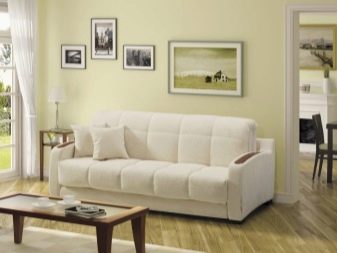
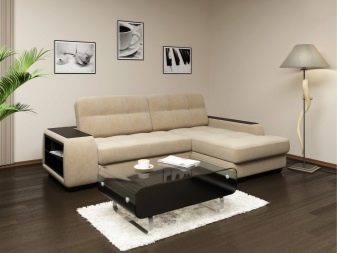
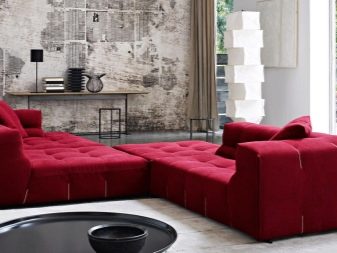
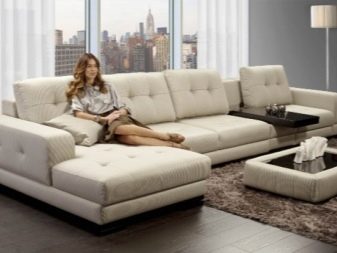
An important indicator of the size of upholstered furniture is the height of the back and seating. Hallway sofas have a low back or are produced without it at all; models with a low back wall and fit are also often installed in halls and bedrooms. In places where it is only planned to sit on the couch - in the kitchen or in the office space, such options are selected so that the height of the seat is not lower than an ordinary chair.
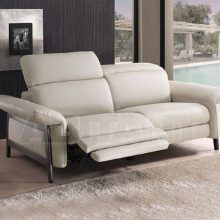
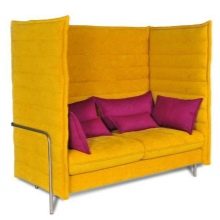
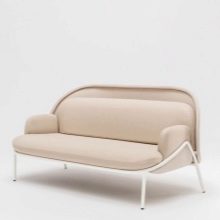
The best choice for a small room would be sofa without side armrests and additional pillowsAnother trick to reduce the size of furniture without losing functionality is to purchase or order a structure without legs. The possibilities of use will become somewhat limited, it is difficult to clean under such a sofa, but its size will be minimized.
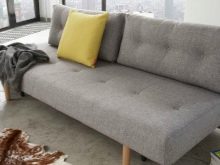
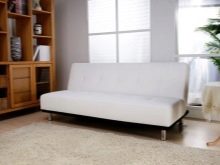
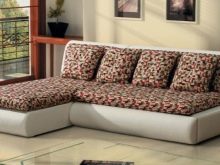
Types of transformation mechanisms
The place of possible installation will depend on the type of mechanism and the method of changing the design. Some models themselves may take up little space, but they require much more space when transforming. The choice of the method of laying out the sofa is also influenced by the purpose of the furniture, the frequency of its use - not all types of mechanisms are designed for frequent use. It is also necessary to take into account the estimated weight that will be on the furniture in the unfolded state. That's why all sofa models are divided into four main types according to the name of the transformation mechanism.
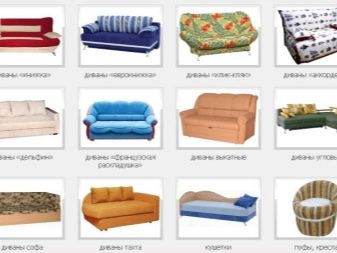
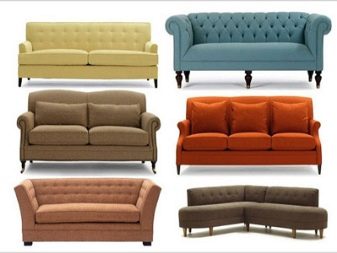
Roll-out
When assembled, the roll-out model consists of three separate elements - the rear part when folded is a backrest, and after being transformed into a horizontal position it becomes a place for the head. The forward-facing seats and the lower part hidden in the structure are used as the main reclining place.
Such models of upholstered furniture are also called - sofas with a telescope transformation mechanism, because the nesting is done from the inside, like a telescope, the individual parts are extended and fixed one after the other. Roll-out versions are mainly installed in large rooms, since in the unfolded state, the width of the furniture increases more than three times.
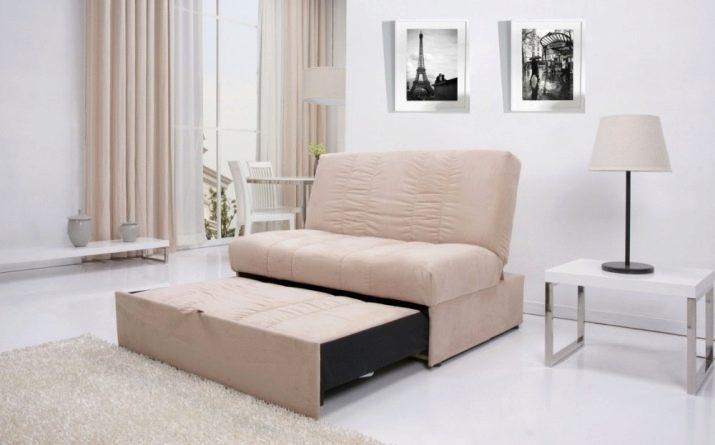
The transformation of the roll-out structure is carried out in several stages.
First, you need to pull on the rag handle located in the lower transverse part of the seat and slide the entire seat frame outward. Then you need to level the sleeping surface of the furniture by lowering the back wall. In some models, additional cushions are used for these purposes - when assembled, they play the role of a second soft back. The retractable mechanism on such models, as a rule, is based on a roller system, less often - special springs are built into the structure, which recline the seats after the lower part is extended.
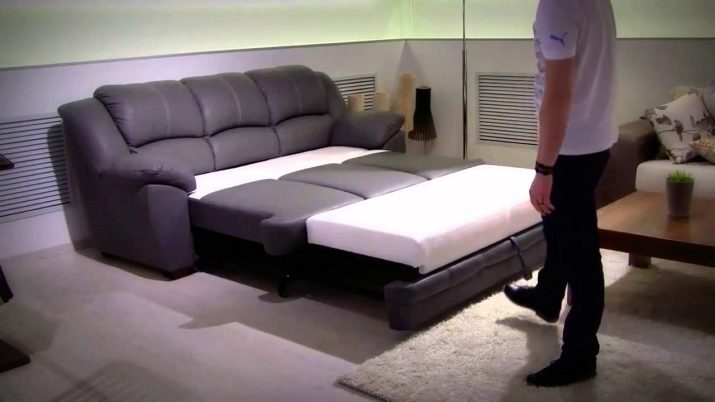
Sliding
When assembled, the sliding models are very elegant and compact, and when unfolded they resemble a clamshell. After the transformation, the front part is installed on special folding supports, the back is lowered, and the complete berth becomes three separate sections. There are several main types of sliding products.
- "French" clamshell - the classic version of sliding upholstered furniture. When assembled, it takes up little space, but when laid out, the front part moves forward one and a half to two meters, depending on the specific model. The "French" mechanism is not recommended for frequent use - a sofa can serve as a berth only occasionally, but basically such models are designed more for sitting.
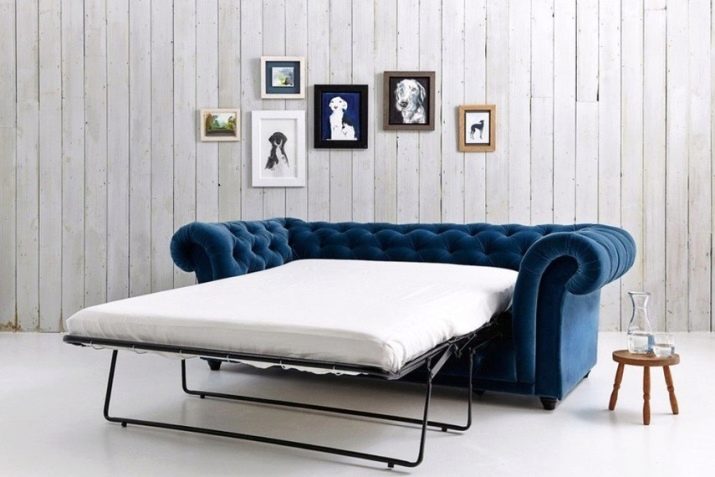
- "American" clamshell. Its design is similar to the previous model - berths are formed from three sections, which are put forward in turn and installed on special supports. The main difference is that the "American" version uses a more reliable and durable mechanism - the furniture is designed for frequent use. However, the cost of such sofas is significantly higher.
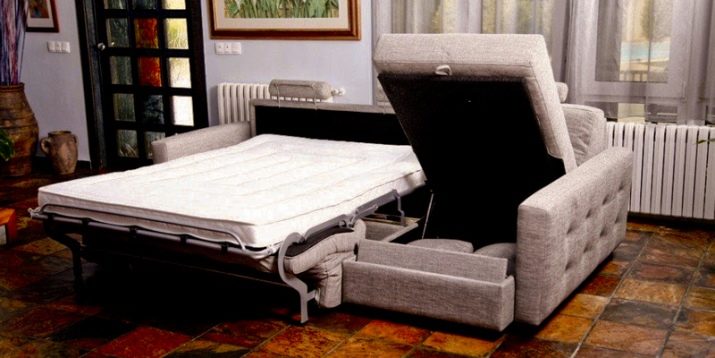
- "Italian" clamshell. Unlike the previous versions, the "Italian" folding bed is transformed not by lifting the crossbeam of the seats, but by pushing the back wall of the sofa forward. Then the sliding mechanism is also activated and the surface is set on the support legs. Compared to the "American" and "French" counterparts, furniture with an "Italian" type of mechanism is equipped with more durable legs.
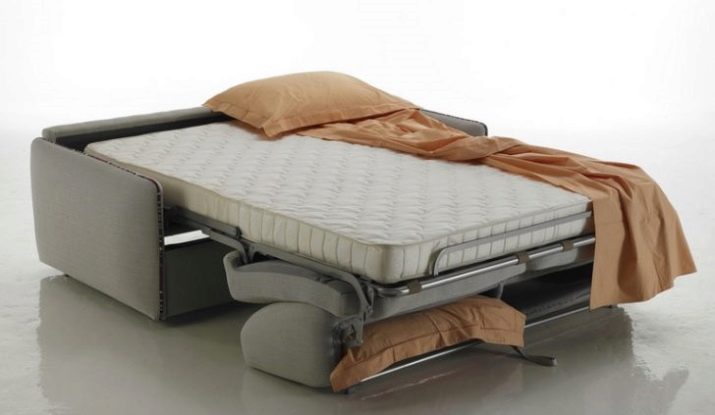
The most common modifications include mechanism of the "Accordion" type. The principle of its operation is that, moving forward, the sleeping places are stretched, as it were, with the help of special springs.Metal spring elements, fixed on both sides of the structure, also help fold the sofa - they tighten the sections inward, setting each in its place. Transforming these models requires minimal effort - just lift the lower seat rail slightly and push it forward.
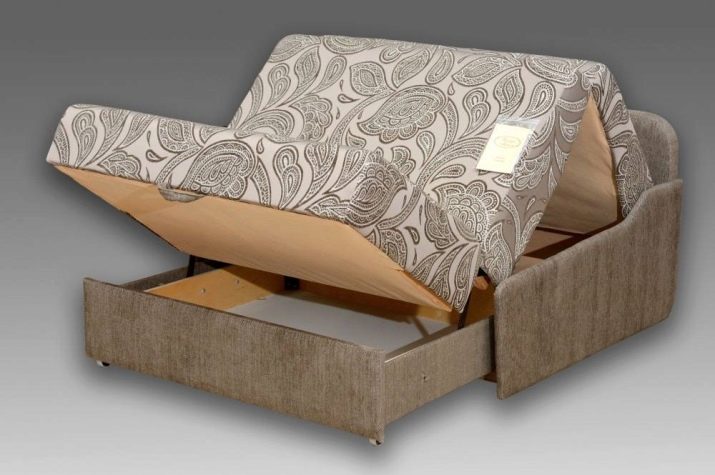
Just like clamshell models, "Accordion" has very compact dimensions when assembled, it is conveniently installed in small rooms. Another important plus is the presence of a bedside table located in the back wall of the furniture. Sliding mechanisms "Accordion" are equipped with reliable working elements, have a long service life, withstand significant weight, are easy to transform, but they also have a drawback - when extending, the supports slide along the floor and can damage the coating.
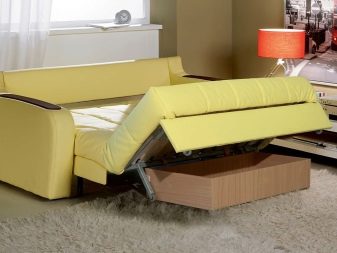
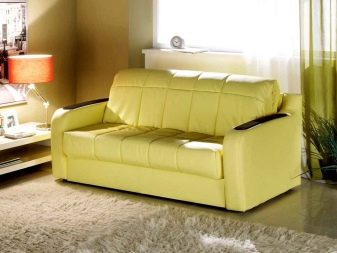
Lifting
Upholstered furniture with a lifting mechanism consists of two identical parts and involves only two positions - a sitting sofa and a sleeping surface. The horizontal transformation is accomplished by raising the seats and reclining the backrest. It is laid on a wooden frame, and the seat beam is lowered into place, in the raised state, the rear wall is fixed with special locking mechanisms.
Before installation, it must be borne in mind that between the sofa and the wall, 10-15 cm of empty space will be required for the back when it is in the lowered position.
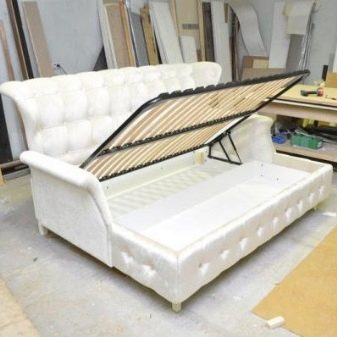
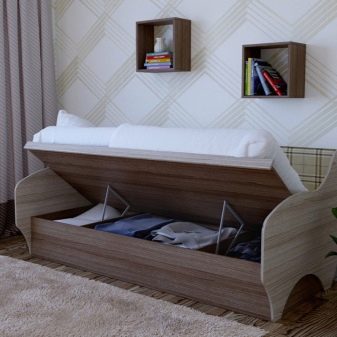
Swivel
Sofas with a swivel mechanism were one of the first to appear on the upholstered furniture market, they are compact and very easy to use, so they always remain relevant. A minimum of elements are involved in the design, there are no brittle parts, rollers. An important plus is the presence of a box for linen. Of the minuses - there should be a distance of 10-15 cm between the sofa and the wall, which is necessary when unfolding, - the seats rise and the back wall folds back to create room for the head.
Thanks to the stoppers, the backrest can be deployed, fixed in the middle position, which is why the models are called swivel ones.
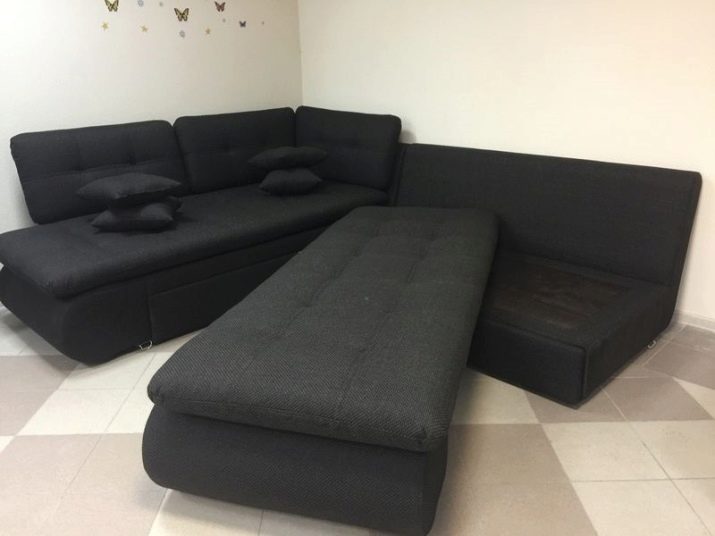
Variety of packing materials
Folding sofas with reliable mechanisms are practical upholstered furniture, but in many respects their service life, and most importantly, their appearance, will depend on the quality of the padding material. Manufacturers most often use as filling for sofas:
- spring blocks;
- polyurethane foam;
- natural latex;
- synthetic winterizer;
- synthetic fluff;
- holofiber.
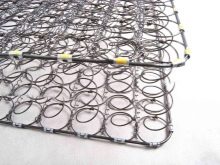
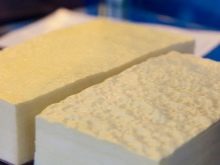
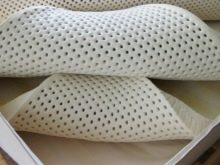



The synthetic winterizer is mainly used to fill the backrests, it gives the structure additional softness and provides a comfortable rest. Synthetic fur and holofiber are used for padding armrests and seats, in the second case they are laid on top of layers of polyurethane foam. The most practical is latex - an environmentally friendly hypoallergenic material with a porous structure, its service life is more than 10 years.
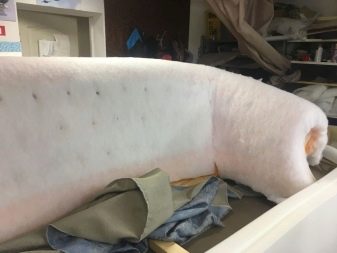
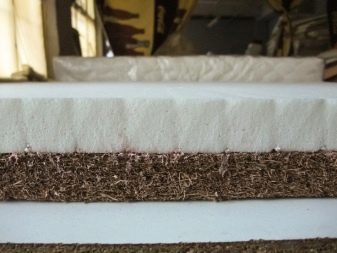
Selection Tips
In addition to the type of mechanism and upholstery, when choosing a sofa, you should pay attention to the quality of the frame, the most reliable ones are made of wood and plywood. Chipboard refers to lower quality materials, breaks down faster, is afraid of moisture, is not recommended for children's rooms, the manufacture of sleeping sofas.
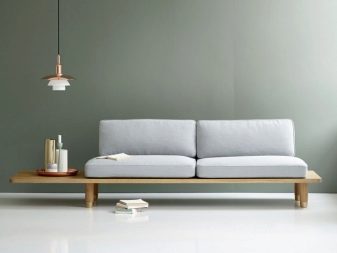
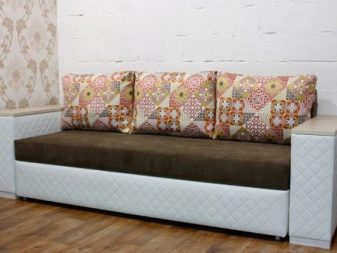
The permissible load must also be taken into account, both in the folded and unfolded position. The main thing is not to base the choice only on the appearance of the product, all its design characteristics must correspond to the features and capabilities of the room.
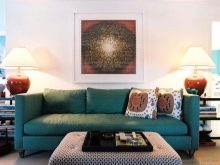
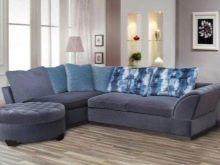
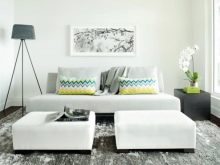
For the types of sofas by type of transformation, see the video.








